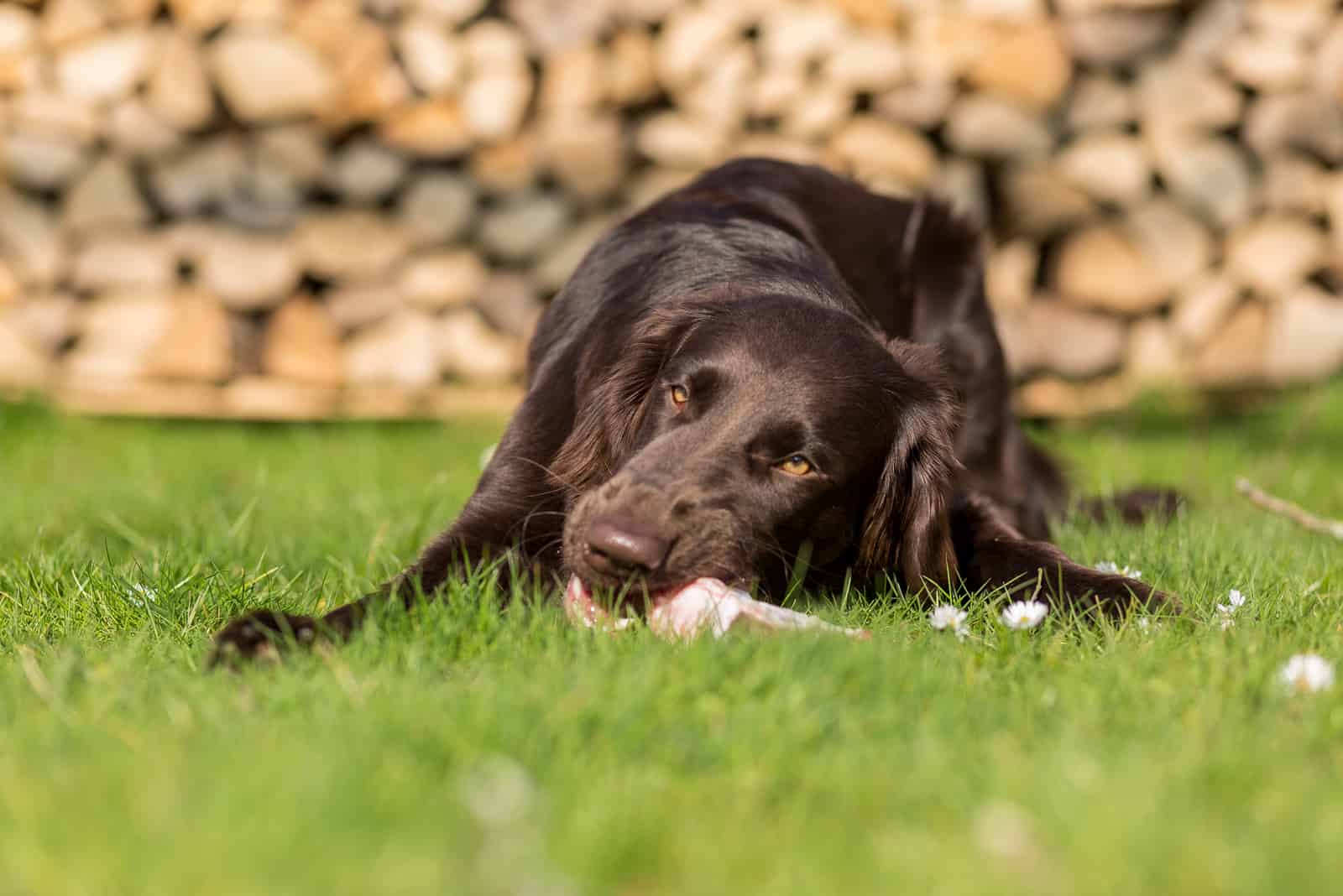Ah yes, dead animals — eu de parfum for our dearest canine companions. It may sound bizarre, and very unpleasant to us, but our dogs don’t seem to mind rolling around in smelly things. In fact, they absolutely love doing this whether we like it or not.
A fancy way to address this dog behavior is to use terms “scent rolling” or “scent-marking”.
Why do dogs roll on dead animals? What’s so special about rolling on dead things? Why does my dog roll in stinky stuff?
Well, we will probably never know the correct answer. But, we can speculate and put up some hypotheses.
While most of us have question marks above our heads, animal ethologists and animal behaviorists are working hard on revealing the truth about this specific dog rolling behavior. And they have found out some very interesting answers.
Before we dive into the possible reasons why dogs roll on dead animals, we will start with some frequently asked questions about the smell of dead animals and what it does to a dog.
What Is The Smell Of A Dead Animal?
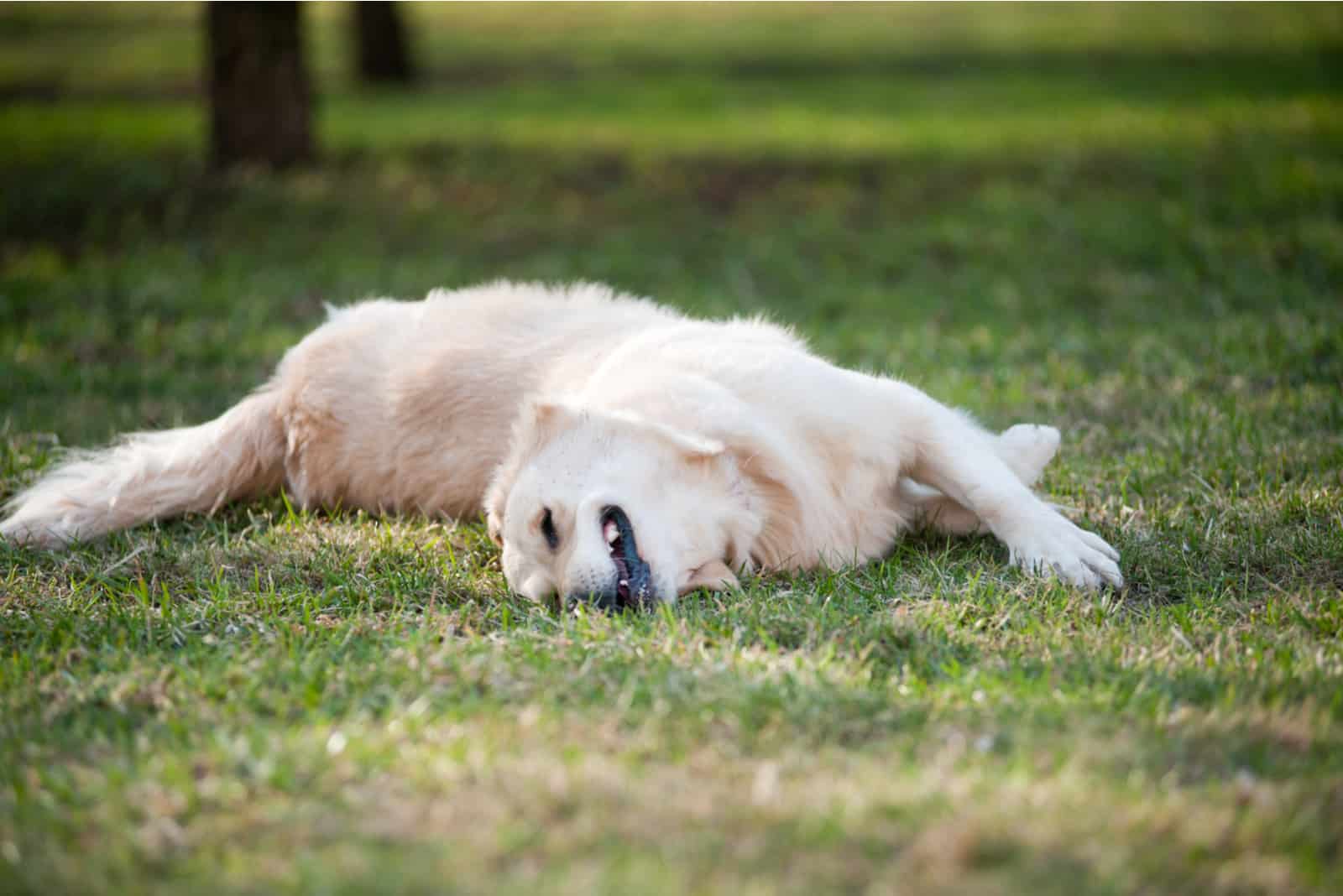
It’s safe to say that people who have never experienced the smell of a dead animal are quite lucky. However, I do believe that the majority of us had the (mis)fortune of stumbling upon a dead thing.
Anyone with a normal sense of smell would take a step back from the animal carcass and say “ew”.
Joke aside, let’s try to describe what a dead animal really smells like and why it smells so bad.
Animal bodies are made from all kinds of chemical compounds. When an animal dies, physiological activities within the body stop and the animal carcass starts to decay. What this means is that those chemical compounds (sulfur dioxide, hydrogen sulfide, ammonia, pyruvic acid, methane, and benzene derivatives) start releasing from the decaying animal body.
Such gasses produce an eye-tearing stench that resembles rotten eggs, rotten cabbage, or rotten fish. Basically, it’s like a gaseous cocktail of all the smelly stuff.
It’s very hard to describe, but the “smell of death” is definitely not something you would enjoy sniffing. But, your dog seems to go bananas for it!
What Does The Smell Of A Dead Animal Do To A Dog?
Makes ‘em go crazy! There’s this indescribable thrill a dog feels when it finally finds a dead animal. Or when it finds random animal droppings on its way. Any stinky thing will do — from dead fish, to garbage and feces.
I can’t even begin to describe how amazing a dog’s sense of smell is. There is no doubt that a dog can smell things better than any of us can. So, considering this fact, some behaviorists and veterinarians speculate that things that smell bad to us, smell great to our dogs. And it’s possible that’s the case. To a dog, the smell of a dead animal is similar to the scent of flowers to us.
Now, some dogs are picky about their smelly things. Pet parents have noticed that their stinky dogs show affinity towards a specific stench. For example, some dogs like cow feces better than horse feces. While some prefer skunk stench over their own!
I remember one day I was walking my friend’s pug named Sam when he stopped to sniff something in the grass. I thought to myself “he’s probably searching for a place to poo”. It was over five minutes, and Sam’s snout was still deep in the grass. Next thing I thought “maybe he is eating something he shouldn’t”.
Sam was definitely eating something he shouldn’t and that was dog poop. The worst thing is that I thought it was chocolate as it spread to my arm. After smelling it, I definitely knew it wasn’t chocolate! Spoiler alert, it was indeed poop. I guess, to Sam, it was doggie chocolate.
What Is The Point Of Rolling In Dead Animals?
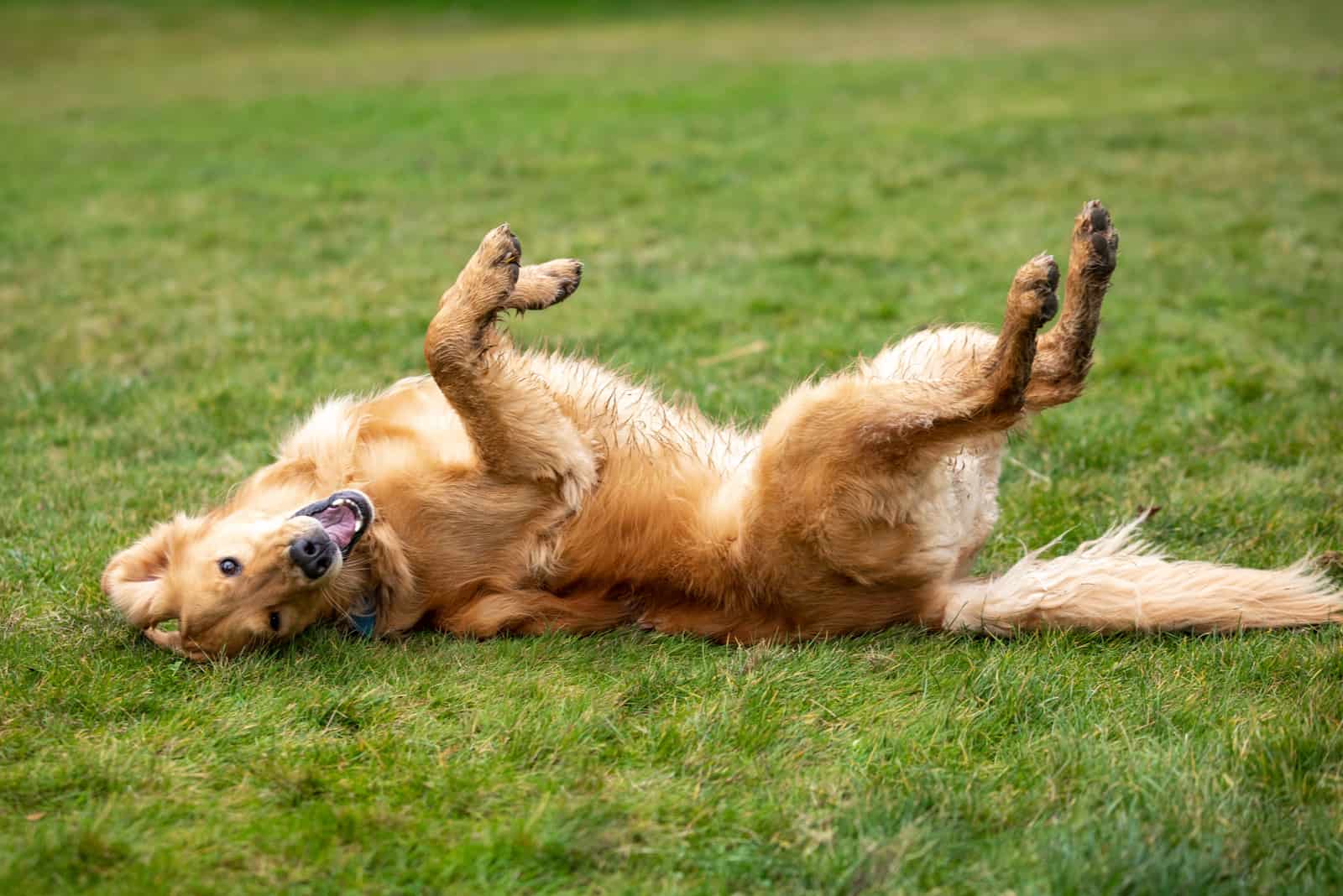
Okay so we all know that our doggies love scent-rolling activities. Some love to proudly retreat animal carcasses to us, as if we are going to praise them for that. Do our dogs exhibit rolling behavior for us to notice them? Or do they do it for other reasons?
Here’s what we have found out about scent-rolling in the doggie world.
Reasons Why Dogs Roll On Dead Animals
Being a dog owner, I used to worry a lot whenever I noticed my dog rolling on something. I believe that’s also the case with you. It took me some time to understand the reason behind why my dog is occasionally rolling on dead animals or poop.
Of course, this is not a pleasant experience for any of us. However, it is a very pleasant experience for our dogs and it’s just their normal, dare I say, healthy behavior.
If your own dog keeps rolling on dead animals and other stinky stuff, just know that this is a completely natural dog behavior.
This is what I’m talking about:
1. It’s Instinctive Dog Behavior
Our domestic dogs inherited a majority of instincts from their wild ancestors. One of the things they inherited is indeed scent-rolling behavior.
The pet dogs we know today originate from wild dogs. Naturally, they carry many genes from the wild. So, next time you ask “why is my dog rolling on dead things?”
Remember that your dog used to be a wild animal.
Camouflage Scents
Dogs are sneaky and extremely intelligent. When a wild dog rolls in a dead animal, its main goal is to hide its own scent. In the wild, dogs do not have a human friend to bring them kibble and treats. So, they must hunt in order to survive.
Using dead animals or poop as a means to hide their own scent is a successful hunting method that helps wild dogs catch their prey.
Hide From Other Animals
As we said, when dogs roll in carrion or animal droppings, they camouflage their own scent. This makes them almost invisible in the nose of both prey animals and predators.
Wild dogs that are away from their pack mates, or younger dogs that still haven’t mastered the skill of hunting use scent-rolling as a method to hide from other predators.
Rolling In Prey Animal Poop
Wild dogs are carnivores. So, their whole diet consists of meat. And so, their whole body produces the odor of a carnivorous animal.
Ethologists have observed a pack of wolves that seemingly prefer to roll in prey animal poop. Now, this is a very smart strategy to hide one’s body scent.
Rolling in prey animal poop makes the wild dog smell more like vegetation, since most prey animals feed on plants. This way, they minimize their predatory smell, making it easier to approach a prey animal.
2. Dogs Like The Smell Of Dead Animals
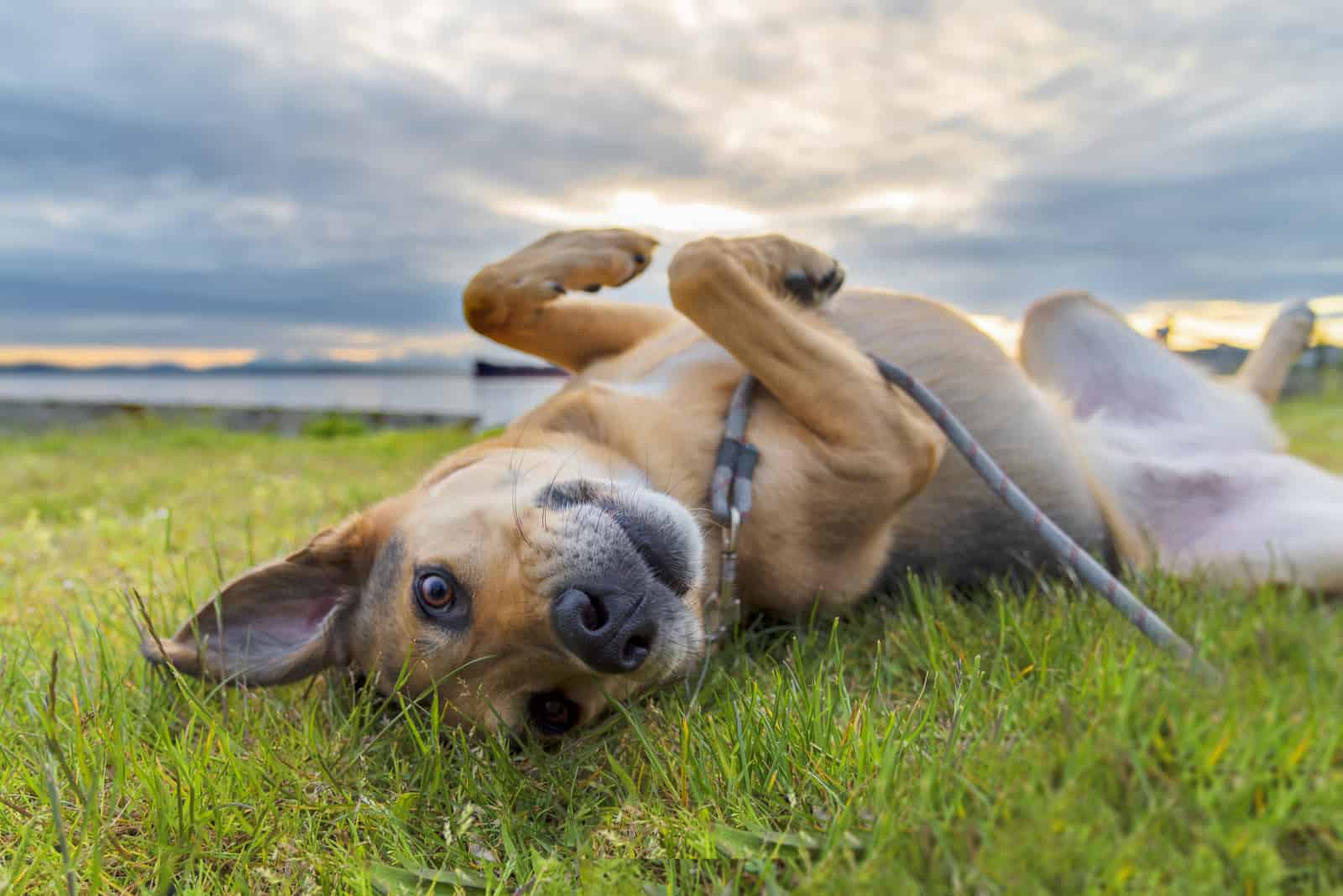
We just have to accept the fact that dogs clearly like the smell of dead animals. I don’t know about you, but I have noticed how pleased and cheerful dogs get when they roll on dead animals or poop.
Not only do they need to roll in stinky stuff, but they’re having the time of their lives when dragging their back across pungent-smelling things. Dogs really are remarkable.
Here’s a task for you.
When you go outside with your dog, and it finds the perfect stinky thing it starts to roll in, pay attention to which body parts it spreads the stink on. You will first notice that your dog rubs its face on the smelly thing, after which it drags its neck and back across it. A dog will almost never scoot its belly across a dead animal or poop.
As to why dogs scoot only specific body parts across stinky things is yet to be determined.
Our first guess is that these parts of the dog’s body contain glands that produce most of the dog’s scent (we’re not talking about anal glands).
Some think that because a dog’s back is the largest area of the body, it’s best for the dog to roll on it in order to entirely camouflage its scent.
3. Social Behavior
We can all agree that our doggies are among the most social mammals in the animal kingdom. They use various methods of communication. But mostly, dogs rely on their sense of smell.
A dog’s sense of smell is extremely sharp and accurate. Some dogs can pick up another dog’s scent that is 12.4 miles away.
Sending Messages To The Pack
When your dog is rolling on a dead animal, it may want to send a message to other dogs in the area “Hey, I was here! Everything’s fine and dandy!”.
A dog might want to inform another dog about the whereabouts of the stinky thing it just found.
Leaving Their Own Scent On Dead Animals Or Poop
“Why don’t I make this smell like me? That way, no other dog will dare to steal my dead fish!”
Leaving its own scent on an animal carcass is for a good reason. Whether it’s marking its territory or leaving clues, a dog probably wants to let others know that it was there first.
What Do You Do If Your Dog Rolls On Dead Animal?
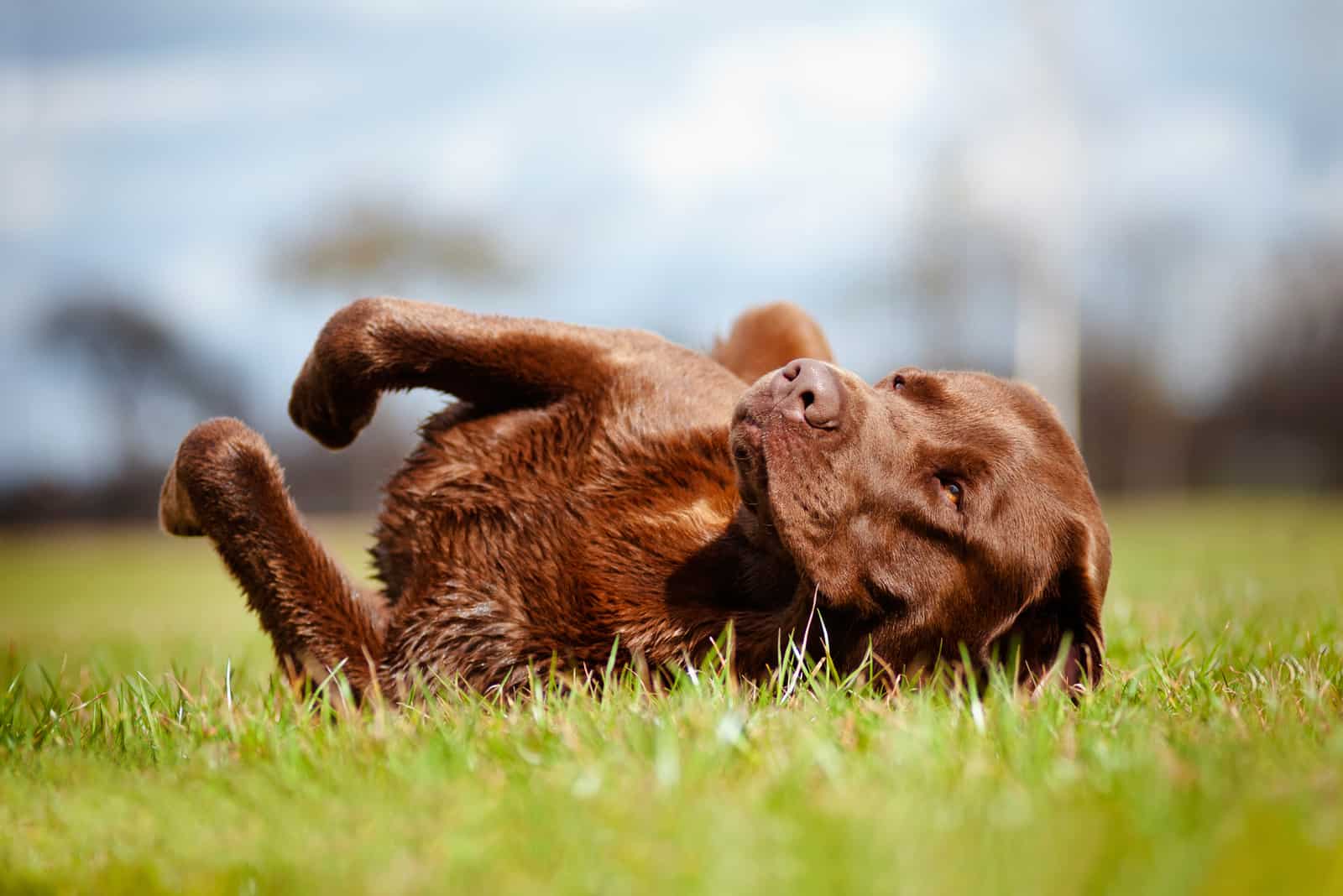
You probably can’t come up with any good ideas because you are too busy worrying about your dog rolling on dead animals. Fear not, help is here!
If your dog finds a dead animal and attempts to roll on it, or even worse — eat it, here are some useful tips and tricks to prevent this.
We’re also covering the dog showering process that is different from the usual dog bath. After all, your stinky dog is SO stinky, that you might think that no dog shampoo will help. Stay optimistic and check out these tips!
Command “Leave It”
When you get a dog, the first thing you want to do is start with early socialization and training. In situations like these, dog training really comes in handy. If your doggie understands the command “leave it” it should leave the dead animal carcass and move along.
However, some dogs are so incarnated with the stench, that they completely ignore their dog owners.
Distract Your Dog
If your dog won’t listen to you, try distracting it with a ball or another toy. Some dogs are obsessed with balls, so it will be easy for dog owners to distract them from rolling on dead animals.
Try getting your dog to play fetch or tag in order to move it away from the carrion. Do not use treats to distract your dog — you will only be rewarding the rolling behavior.
Use Smells Your Dog Hates
You can try using natural smells that dogs hate, such as citrus scents, onions, garlic, chili peppers, vinegar, and so on. This could work on a specific area in the backyard your dog likes to roll on. There once was probably a dead animal or feces there.
However, this may not be a good idea if your dog actually likes these scents or attempts to eat the above mentioned foods.
Bathe Your Dog
So, you’re back home with your smelly dog and everyone around you is tearing up from the stench. Well, it’s time to take a bath — both of you!
Brush Thoroughly
It’s a good idea to invest in a high-quality dog brush. Start by brushing out your dog’s fur to remove any stinky things. It’s also good to brush your dog prior to bathing it because it detangles its coat.
Shampoo And Rinse
Once your dog’s coat is soaking wet, use a deodorizing shampoo, let it sit a few minutes, and rinse it well.
The key here is to let the shampoo stay for a while in order to eradicate the stench.
Use Baking Soda
Dog’s coat can benefit from baking soda if you use it in two ways: on your dog’s dry coat, or as a mixture with 3% hydrogen peroxide.
Sprinkle some baking soda on a dry dog’s coat and let it sit for a while. Then what you will want to do is take a quality dog brush and brush out the powder. Do not let any baking soda residue stay on your dog’s coat.
As for the hydrogen peroxide baking soda mixture, you can use it as a pre-final phase in dog bathing, after which you must rinse your dog’s coat thoroughly.
Final Thoughts
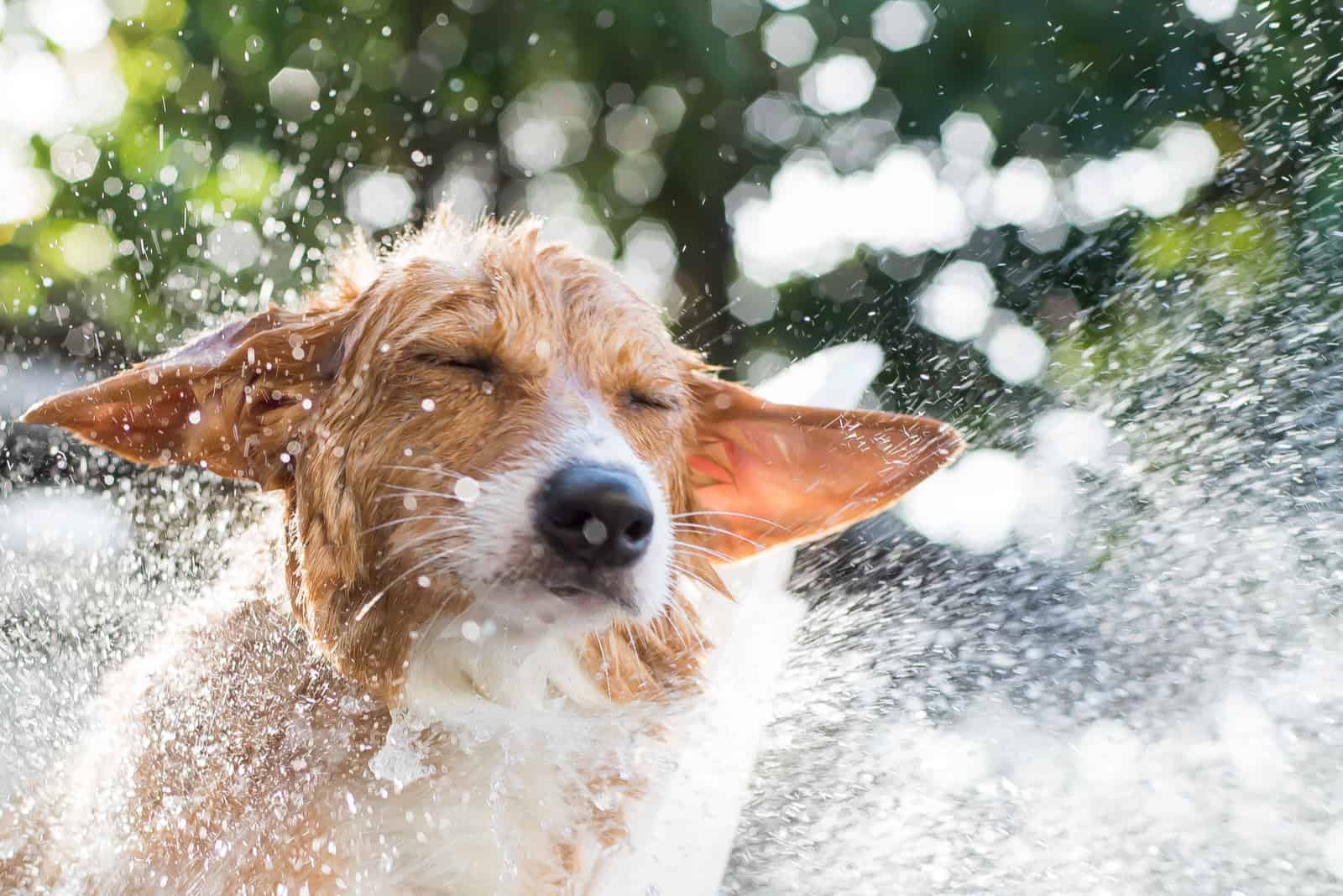
Dogs are truly fascinating creatures. Although it seems funny and disgusting at the same time, dog rolling behavior is a unique form of behavior.
Here are some things to keep in mind:
• Too much bathing is not good for your lovely doggo. Bathing your dog too frequently will cause it to lose its natural scent. This will only result in obsessive rolling in stinky things to remove the artificial odor from its fur.
• If you can’t groom your stinky dog by yourself, contact your favorite dog groomer who is ready to handle some serious stench!
• Another thing to keep in mind is to keep an eye on your dog when it is rolling on dead animals. If your dog eats a dead animal or its feces, it could be fatal. Consuming such stinky substances may result in the development of serious bacterial or parasitic diseases. Just to be on the safe side, when your dog eats a dead animal, contact your veterinarian to find out what to do next.
Now you can answer the confusing question “Why do dogs roll on dead animals?” and help other dog owners understand this silly dog behavior!
Read Next: Why Does My Dog’s Breath Smell So Bad & How Do I Treat It?
